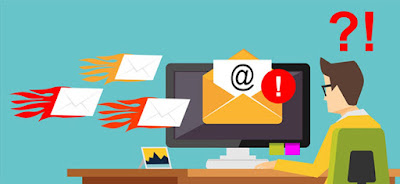WHAT IS EMAIL BOMBARDMENT?


As you may already know, phishing is a technique that consists of tricking the user into stealing confidential information, access codes, etc., making him believe that he is on a completely trustworthy site.
Until now,
hackers have used emails to launch these types of attacks, but with the massive
use of social networks and smartphones with an Internet connection, the avenues
of attack are multiplying.
These emails
or messages include a link that takes the user to a website that is
theoretically known, but is a copy of the original where confidential
information is requested.
In this way,
overly trusting users who do not have adequate antivirus protection
could be involved in this type of attack whose main objective is to steal
personal data.
With the
economic crisis, phishing attacks have proliferated that are hooked on the
promise of a great job or an easy way to get money.
Now, the
most important and frequently asked question arises that is how to stay safe
from this? But, after reading this blog your all doubts will be cleared.
Read till
end to know the facts and important points.
10 TIPS TO PREVENT PHISHING ATTACKS
1. Learn how to clearly identify
suspected phishing emails
There are
some aspects that unequivocally identify this type of email attack:
· They captures the names and details
of the companies
· They carry as sender the name of the
company or that of a real employee of the company
· They include websites that are
visually the same as those of real companies
2. Verify the information source of
your incoming emails
Your bank
will never ask you to send your passwords or personal data by mail. Never
answer these types of questions and if you have a slight doubt, call your bank
directly to clarify it.
3. Never enter your bank's website by
clicking on links included in emails
Never click
on any links in your email and enter your bank details because they might be
secretly captured
If you are
using any bank server type that link the browser directly for staying safe
4. Strengthen the security of your
computer
Common sense
and prudence is as essential as keeping your computer protected with a good antivirus that blocks
this type of attack. Also, you should always keep your operating system and web
browsers up to date.
5. Enter your confidential data only
on secure websites
Secure
websites must begin with 'https: //' and the icon of a small closed padlock
must appear in your browser.
6. Periodically review your accounts
It never
hurts to check your bank accounts periodically, to be aware of any
irregularities in your online transactions.
7. Not only online banking lives
phishing
Most of the
phishing attacks go against banks, but in reality they can use any other
popular website of the moment as a hook to steal personal data: eBay, Facebook,
Pay Pal, etc.
8. Phishing knows languages
Phishing
knows no borders and attacks can reach you in any language. As a general rule,
they are poorly written or translated, so this can be another indicator that
something is wrong. If you never enter your bank's English website, why should
a statement from him in this language now reach you?
9. Before the slightest doubt, be
prudent and don't risk it
The best way
to always get it right is to systematically reject any email or communication
that affects you providing confidential data.
Delete these
types of emails and call your bank to clarify any questions.
10. Find out regularly about the
evolution of malware
If you want
to keep up to date with the latest malware attacks, recommendations or tips to avoid
any danger on the network stay with us.
So, to stay
safe from phishing or any attacks you should have a good antivirus and protect
your basic and important details from going your server to hackers who can use
it for another or wrong purpose.
Comments
Post a Comment